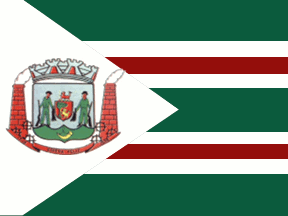 image
by Dirk Schönberger, 29 June 2010
image
by Dirk Schönberger, 29 June 2010Source: http://www.esperafeliz.mg.gov.br/simbolos.htm

Last modified: 2012-03-03 by ian macdonald
Keywords: minas gerais | espera feliz |
Links: FOTW homepage |
search |
disclaimer and copyright |
write us |
mirrors
 image
by Dirk Schönberger, 29 June 2010
image
by Dirk Schönberger, 29 June 2010
Source:
http://www.esperafeliz.mg.gov.br/simbolos.htm
Horizontally striped green-white-green-white-green, with a narrow red stripe on the two white stripes; extending off the hoist a white triangle bearing the municipal arms.
Official website at
http://www.esperafeliz.mg.gov.br/
Dirk Schönberger,
29 June 2010
The municipality of Espera Feliz (22,859 inhabitants in 2010; 325 sq. km) is
located in southeastern Minas Gerais, on the border with Espírito Santo, 380 km
of Belo Horizonte.
The symbols of Espera Feliz, designed by
Arcinoé Antonio Peixoto de Faria, are prescribed by Law No. 18 of 15 July
1972.
On the flag, the coat of arms represents the municipal government,
while the white triangle containing it represents the town of Espera Feliz
proper, as the seat of the municipality. The triangle is the heraldic symbol
of liberty, equality and fraternity, while the white color symbolizes peace,
friendship, work, prosperity, purity and religious feeling. The white stripes
charged with a red stripe, issuing from the triangle and dividing the flag,
represent the municipal power spreading over the whole municipal territory.
The red color represents patriotic feeling, commitment, audacity,
intrepidness, courage and valiance. The green parts represent the rural
estates on the municipal territory. The green color is a symbol of honor,
civility, courtesy, abundance and joy; it is also the symbolic color of hope,
because the greening fields promise profuse harvests. In compliance with
the heraldic rules, the municipal flag shall have the official dimensions of
the national flag, that is 14 units in height on 20 units in width.
The coat of arms is blazoned as follows:
"Samnitic shield surmounted by a
six-towered mural crown argent ports gules. Argent an escutcheon gules a lion
or accosted to a pine vert, surmounted by a lion of the same [...] surrounded
by two hunters proper each holding a rifle sable and a hare of the same clad vert wearing a hat sable, standing on a triple mantle vert charged with a
hunting horn or. The shield supported by two chimneys gules each charged with
three gears sable, issuing from a scroll gules inscribed in letters argent
the toponym 'Espera Feliz' and the date '17-12-1938'."
The Samnitic
shield, introduced from France to Portugal, symbolizes the Latin race as the
main colonist and founder of the Brazilian nation. The mural crown is the
universal representation of power; its six towers represent a town of third
rank, that is the seat of a municipality. Argent (silver) represents
peace, friendship, work, prosperity, purity and religious feeling. The
escutcheon reproduces the arms of the Pinheiro family, as a tribute to Manoel
Francisco Pinheiro, famous colonist and introducer of coffee cultivation in
the region, responsible of the development of the town. Gules (red)
symbolizes patriotic feeling, commitment, audacity, intrepidness, courage and
valiance. The hunters recall the traditional origin of the name of the
municipality, allegedly given by the members of the Engineering Commission of
the Imperial Government who hoped to find profuse game in the region.
Accordingly, they called the place Feliz Espera (Happy Hope), subsequently
renamed Espera Feliz. Sable (black) represents caution, wisdom, moderation,
patience and strong-mindedness. The triple mantle represents the Serra do
Caparaó, the principal relief in the municipality and a tourist's hotspot.
Vert is a symbol of honor, civility, courtesy, abundance and joy, as well as
the the symbol of hope, alluding in the greenness of the field in spring,
promising good harvest. The hunting horn represents cattle breeding set up on
a green field representing agriculture and the early resources of the
municipality. The smoking chimneys and the gears represent transformation
industries and their contribution to the municipal economy. The scroll
bears the name of the municipality and the date of its political
emancipation.
http://www.esperafeliz.mg.gov.br/simbolos.htm
Ivan Sache, 4
February 2012